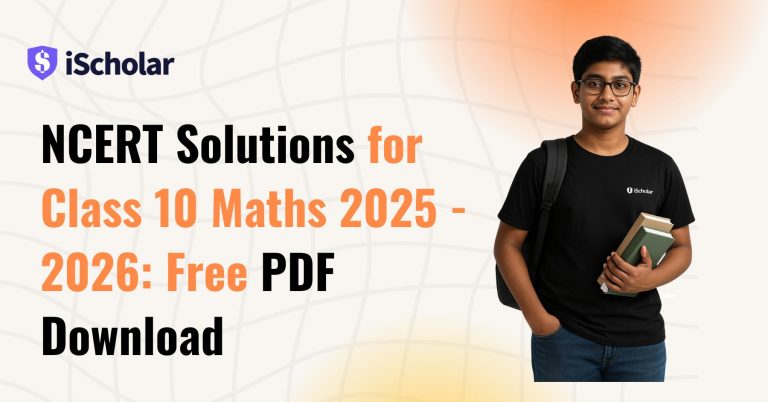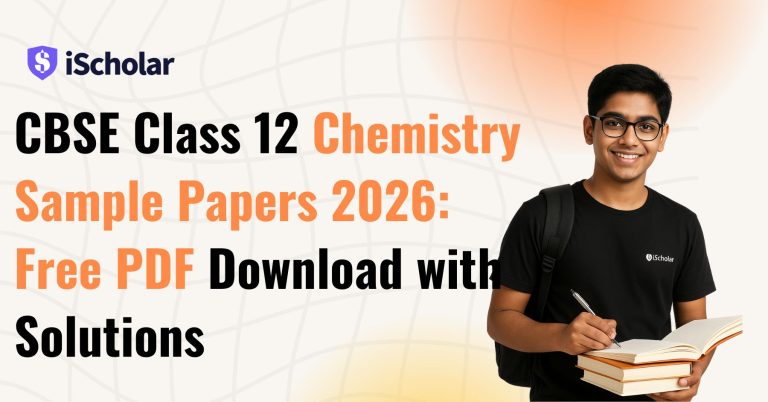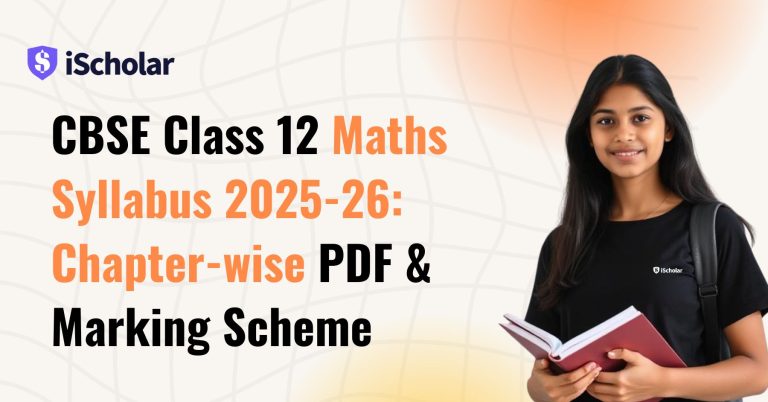Are you an ISC Class 12 Math student preparing for the 2026 board exams? Everything you need to know about the ISC Mathematics Class 12 syllabus for the 2025–2026 academic year is included in this extensive reference. You will discover all the necessary information in one location, including the textbook, syllabus structure, marking scheme, exam patterns, sample question papers, and preparation tips.
ISC Class 12 Maths 2025-26 – Download the Latest PDF
The objective of the Class 12 ISC Maths Syllabus is to build strong fundamentals in algebra, geometry, trigonometry, and statistics, ensuring that students are well-prepared for both academic and real-world applications.
ISC Class 12 Maths Paper Evaluation Criteria
A structured assessment format, comprising both internal and external evaluation, is used in the course. The final grade is divided between project work and a written exam.
- Theory Exam: 80 marks (3 hours)
- Project Work: 20 marks
Students’ comprehension of fundamental ideas and their capacity to apply them in real-world situations are assessed by the ISC Maths syllabus Class 12 assessment.
a) ISC Class 12 Maths Distribution of Marks
The Class 12 ISC Marking Scheme for Mathematics assigns grades according to the weighting and difficulty of each topic. The theory paper is divided into three sections:
- Section A (65 marks): Students must answer all questions compulsorily.
- Sections B and C (15 marks each): Students must choose either Section B OR Section C
b) ISC 2026 Maths Exam Pattern
The Mathematics Syllabus Class 12 ISC tests students’ conceptual understanding and application abilities across various topics using a structured format consisting of multiple-choice, short-answer, and long-answer questions.
| S.No. | ISC Class 12 Maths Units | ISC Class 12 Maths Chapter-wise Weightage |
| SECTION A: (Compulsory – 65 Marks) | ||
| 1 | Relations and Functions | 10 Marks |
| 2 | Algebra | 10 Marks |
| 3 | Calculus | 32 Marks |
| 4 | Probability | 13 Marks |
| SECTION B: (Optional – 15 Marks) | ||
| 5 | Vectors | 5 Marks |
| 6 | Three-Dimensional Geometry | 6 Marks |
| 7 | Applications of Integrals | 4 Marks |
| OR | ||
| SECTION C: (Optional – 15 Marks) | ||
| 8 | Application of Calculus | 5 Marks |
| 9 | Linear Regression | 6 Marks |
| 10 | Linear Programming | 4 Marks |
| Total (Theory) | 80 Marks | |
| Project Work | 20 Marks | |
| Grand Total | 100 Marks | |
ISC Class 12 Mathematics Detailed Syllabus Overview
The Class 12 ISC Mathematics Syllabus is divided into three divisions and covers various topics. In addition to selecting between Sections B and C, students are required to attempt Section A mandatorily.
Section A (65 Marks) – Mandatory Questions
1. Relations and Functions
- Types of Relations: Reflexive, symmetric, transitive, equivalence relations
- Functions: One-to-one, onto, composite, and inverse functions, binary operations
- Inverse Trigonometric Functions:
- Definition, domain, and range
- Principal value branches
- Graphs and properties
2. Algebra (Matrices and Determinants)
- Matrices:
- Concept, types, operations
- Elementary row and column transformations
- Invertible matrices and their properties
- Determinants:
- Properties of determinants
- Minors and cofactors
- Applications: Area of a triangle
- Systems of Linear Equations:
- Consistency and inconsistency
- Solution using the inverse of matrices
3. Calculus
- Continuity and Differentiability:
- Chain rule
- Derivatives of composite, implicit, exponential, logarithmic, and parametric functions
- Mean Value Theorems:
- Rolle’s Theorem
- Lagrange’s Mean Value Theorem
- Geometrical interpretation of both
- Applications of Derivatives:
- Rate of change of quantities
- Increasing and decreasing functions
- Tangents and normals
- Approximations
- Maxima and minima (both local and absolute)
- Integrals:
- Indefinite integrals – basic techniques of integration:
- Substitution
- Partial fractions
- Integration by parts
- Definite integrals and their properties
- Evaluation of definite integrals
- Indefinite integrals – basic techniques of integration:
- Differential Equations:
- Definition, order, degree
- General and particular solutions
- Methods of solving first-order differential equations:
- Variable separable
- Homogeneous
- Linear differential equations
4. Probability
- Conditional probability and multiplication theorem
- Independent events
- Total probability theorem and Bayes’ theorem
- Random variables and their probability distributions
- Mean and variance of discrete random variables
- Bernoulli trials and binomial distribution
Section B (15 Marks) – Optional
5. Vectors
- Vectors and scalars, classification of vectors
- Direction cosines and direction ratios
- Operations: Addition and scalar multiplication
- Scalar (dot) product and vector (cross) product
- Scalar triple product
6. Three-Dimensional Geometry
- Direction cosines and ratios of lines
- Cartesian and vector equations of a line and a plane
- Coplanar and skew lines
- Shortest distance between two lines
- Angle between:
- Two lines
- Two planes
- A line and a plane
- Distance of a point from a plane
7. Applications of Integrals
- Area under simple curves
- Area between two curves
- Area bounded by curves and coordinate axes
Section C (15 Marks) – Optional
8. Application of Calculus in Commerce and Economics
- Cost function, revenue function, and profit function
- Marginal cost and marginal revenue
- Breakeven point
- Curve sketching involving C, R, P, AC, MC, AR, MR functions
9. Linear Regression
- Regression lines: x on y and y on x
- Least squares method
- Regression coefficients: Calculation and properties
- Estimating values using regression equations
10. Linear Programming
- Introduction to constraints and objective functions
- Formulating Linear Programming (LP) problems
- Graphical method of solving LP problems (two variables only)
- Identification of:
- Feasible and infeasible regions
- Bounded and unbounded solutions
- Optimal feasible solution
ISC Class 12 Maths Textbook
Students can refer to the textbook of
https://books.google.com.gh/books?id=DR8tDAAAQBAJ&printsec=frontcover&hl=en&pli=1#v=twopage&q&f=true
ISC Class 12 Maths Internal Assessment: Mathematics Project Work (20 Marks)
Students must do two projects, one from Section A and one from Section B or C, according to the ISC Maths syllabus for class 12. To be assessed by the visiting examiner and the subject teacher,
a) Criteria for Marks Allocation – ISC Maths Project
- Overall format: 1 mark
- Content: 4 marks
- Findings: 2 marks
- Viva-voce: 3 marks
- Total: 10 marks per project (20 marks total)
b) Suggested Project Work Topics for ISC Class 12 Maths
There are many suggested project topics in the syllabus:
Section A: Functions, inverse trigonometric functions, linear equations, determinants, Mean Value theorems, integrals, differential equations, probability, and maxima/minima projects
Section B: Geometry, vector algebra applications, and locating regions enclosed by various curves
Section C: Regression analysis, linear programming applications, and cost and revenue function projects
ISC Maths Board Exam Preparation Tips
Scoring well in Class 12 ISC Maths isn’t about studying harder; it’s about studying smarter. Here are some expert-recommended methods to improve your preparation:
i) Adhere to the Official Syllabus
Start your preparation by carefully reviewing the ISC syllabus for Mathematics Class 12. It guarantees that you don’t waste time on unrelated subjects and covers only what is necessary.
ii) Previous Year Practice Papers (PYQs)
You can better grasp the question format, key subjects, and grading patterns by working through past ISC Maths question papers.
iii) Pay Attention to Sample Papers
Solve the SC Maths sample/specimen papers as soon as possible. These frequently highlight question formats that the board favours and closely resemble the exam structure.
iv) Understand before memorizing
Strive to understand the fundamental ideas underlying formulas and theorems rather than memorizing them by heart. This will enable you to use them successfully in any situation.
v) Make Quick Revision Sheets
For every chapter, keep brief notes or formula charts. They aid in remembering essential details and are invaluable for last-minute revision.
vi) Timed Practice Sessions
You may imitate actual exam conditions by using a timer to complete practice exams. This improves time management, accuracy, and speed, which are crucial on the real exam.
FAQs on ISC Class 12 Maths
Q1. What is the latest 2025–2026 ISC Class 12 Maths syllabus?
Relations and Functions, Algebra, Calculus, Probability, Vectors, and optional units like Linear Regression and Linear Programming are among the subjects covered in the ISC Class 12 Maths syllabus for 2025–2026.
Q2. How can I effectively get ready for the ISC 12 Math board exams?
Focus on comprehending ideas rather than memorizing to do well in ISC 12 Math. Follow the class 12 ISC maths syllabus, solve sample problems, and practice frequently with the ISC maths 10-year question papers. Throughout the exam, take notes for review and try out practice exams.
Q3. Are the previous year’s papers useful for preparing for the Class 12 ISC Math exam?
Yes, solving ISC Math PYQs (Previous Year Questions) is essential. It helps you comprehend the exam format, frequently asked questions, and topic weighting as specified in the ISC Mathematics Class 12 syllabus.
4. Is there a particular book that students in ISC Class 12 Mathematics should follow?
Students should first concentrate on the official ISC Class 12 maths syllabus and textbooks. Supplementary material aligned with understanding the ISC mathematics class 12 can help reinforce concepts and offer additional practice questions.
5. What is the ISC Class 12 Math 2026 exam format?
There are 20 marks for internal assessment and 80 marks for theory in the ISC Class 12 math exam. While students can select Sections B and C, Section A is compulsory. The primary focus of the question paper is on the topics, including calculus, algebra, vectors, and probability.





